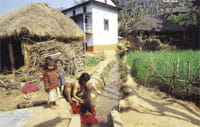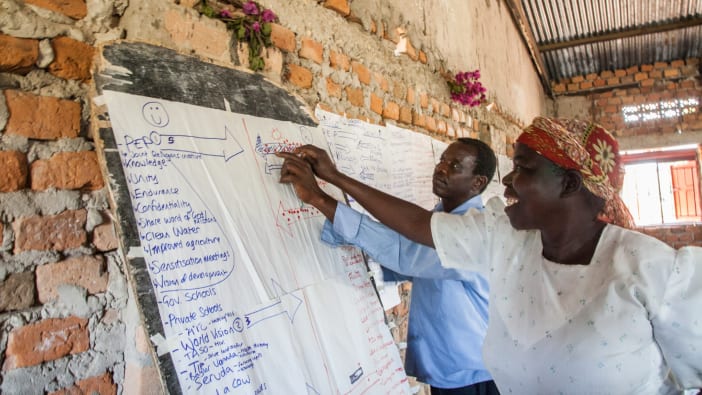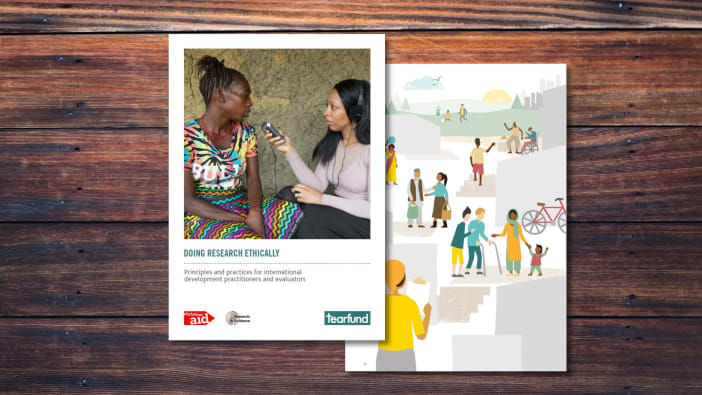This game can help people to understand the special efforts needed to ensure that development activities really benefit the marginalised or poorest people within a community. It can be used with development workers, local government or NGO project staff, or village development committees.
Materials required
- Thirteen parallel lines marked on the ground – using tape or chalk works well indoors, or lines in the ground if outdoors. The lines ensure that everyone takes steps of the same size. The seventh line (in the centre) should be much longer than the others.
- A prize for the ‘winners’ put at line 13.
- Coloured strips of paper, beads or seeds to divide the group into three groups – Red, Green and Blue.
Count participants before the game and arrange that 10% will get red, 20% get green and 70% get blue. It is important that the colours are assigned randomly – for example, by participants picking coloured beads from a bag.
Instructions
Explain that you are a development worker bringing resources for three projects to help them ‘win’ the prize which represents success. The participants represent local farmers. Each person takes a coloured item at random and lines up along the centre (seventh) line facing towards the prize at line 13.
When everyone is ready, read the descriptions for each colour. You should adapt the game for your context by adding local details to the descriptions.
- RED You belong to a rich farming family. Your father owns two homes; one in this village and one in the capital city. You were sent to school in the city and have returned home to help run the farm.
- GREEN Your parents have a small farm. Your mother is non-literate but your father can read and write. You went to the local village school, doing your farm chores before and after school. Your family owns a radio and you listen to the agricultural programmes. Your uncle works at the local health post, so as a child you always had your vaccinations and worm medicines. Your family has a vegetable garden and one cow which gives milk. With good nutrition and health, you were able to pay attention and learn in school.
- BLUE You and your parents are non-literate and of low social status. The women were married young and now have many children. The men work as day labourers in others’ fields. You take care of your own tiny garden plot in the early morning and late evening.
In this way, participants have been randomly assigned different social and economic statuses within the community. Now you are ready to play the game.
In response to each of the situations presented, the participants will either take steps forward or back, depending on which colour they are. A step forward represents increased economic stability and wellbeing. A step backward represents further economic hardship and inequality. This activity helps the participants to gain a deeper understanding of how development projects can impact different groups within a community.
The game
Describe each project and then tell each group where to move and why.
PROJECT 1 Farmer training and seed distribution
A training for farmers is offered. Improved quality seeds will be distributed to all participants.
- REDS You offer to rent your fields to the class for the training period. You then not only attend free (One step forward) but receive income. (Second step forward)
- GREENS After seeing the notice for the class you sign up and receive seeds. (One step forward)
- BLUES You cannot read the notices. You do not own a radio. You have to sit outside the tea shop because of your low social status, so you never hear the discussions about the training. You do not hear about it and do not attend. (One step backward) You used to sell a few poor vegetables from your plot, but now you cannot compete with the improved quality seeds so you lose income. (Second step backward)
PROJECT 2 Community drinking water system
You hold a community meeting to discuss a new water system. You will donate the pipes if community members donate the labour. Everyone attends the meeting.
- REDS You take a leading role in the meeting and donate money to help your community. (One step forward) After the system is built, one tap is located on your property. (Second step forward)
- GREENS You attend the meeting. You donate your labour to help the construction and encourage your neighbour to also participate. When the system is done, there is a tap located only five minutes walk from your home. (One step forward)
- BLUES You sit at the back at the community meeting. You cannot spare a day away from your day labour job to help with the construction. When the system design is discussed, no-one mentions putting taps near your area. Because you do not help to build the system, you do not get a tap (One step backward) and must continue to carry contaminated water from the stream. This means more illness and lost income. (Second step backward)
PROJECT 3 Literacy classes
A literacy class is starting in your village. Emphasise that this is especially to help the Blues.
- REDS You are hired as facilitator. (Two steps forward for income and prestige)
- GREENS You send your mother to literacy class so she is no longer cheated in the market. (One step forward)
- BLUES The men cannot attend because they farm their small plots in the evening after they finish their day labour. The women cannot attend because they have too many small children to look after and nearly always at least one child is sick. (Two steps backward)
The end of the game
The Reds have now taken six steps forward and should be able to reach the prize.
The most important part of the game is the discussion at the end. Begin asking these questions while the participants are still standing in place.
- Ask what happened. What do they see? (Unintentional widening of the gap between rich and poor.)
- If we were to keep playing, would the Greens eventually win? (Yes, if sufficient prizes / resources.) Would the Blues win if we play long enough? (No.)
- Ask Blues how it felt? Was it fair? Why not? Remind people that everyone started at the same level. After the Blues answer, ask the Reds and Greens how they feel about it.
- Whose fault is it that the Blues did not participate or benefit from the projects?
- In this game did the Reds or Greens mistreat or discriminate against the Blues?
Then invite people to sit down and talk about these issues. Discuss who the Reds, Greens and Blues might be in your community. The game should help to show why development projects often need to focus on poor and marginalised people (the Blues). It is not because the Reds and Greens are less valued or even less deserving – they are also good people and hard workers. Jesus taught us to care for poor people because they deserve justice. Because of social inequalities, Blues need special attention to ensure that they are able to take equal advantage of opportunities.
To encourage people, finish by sharing local success stories that show how you can work with Blues without excluding Reds and Greens.
Karen L Stoufer , Christian Veterinary Mission.
Email: [email protected]
Website: www.cvmusa.org
Success story from Nepal
A women’s group was going to do a livestock project. The Reds and Greens wanted to raise goats and the Blues wanted to raise pigs. We helped them to set up a project where the pigs arrived first and when that was successfully running, then the goats came. The women with more resources (Red and Green) helped the Blues because it was in their interest – everyone’s success was linked.
It is important to consider how the project impacts all sections of the community during the project design stage. Think of ways to encourage Blues to participate.










